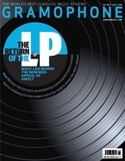Texte paru dans: / Appeared in: |
|
|
Outil de traduction (Très approximatif) |
|
|
Reviewer:
Iain Fenlon Apart from the wellknown Ciaconna and the Lamento della Regina d’Inghilterra recorded by Anne Sofie Von Otter some years ago (Archiv, 3/99), the music of Antonio Bertali is virtually unknown. His oratorio La Maddalena is structured in three parts, with its opening section cast as an allegorical dialogue between Pentimento and Amor verso Dio (sung by bass and tenor, the former here richly resonant), underpinned by a consort of six viols and continuo. If the tone here is overwhelmingly dark, the second part, which introduces the two women closest to Jesus, the Virgin Mary and Mary Magdalene, introduces a more optimistic flavour with occasional episodes of major tonality and triple dance rhythms. Luciana Mancini’s Maria is pleasantly bright in the upper register, firm and rounded in the middle range, and there is some discreetly applied ornamentation; the two voices are nicely matched and blend well.
It is only with the third and final part that the full cast of six characters appears, fuller textures in places contrasting with the largely arioso style of so much of the writing. Continuing the theme of the penitent Magdalene, Bertali’s piece is framed by the occasional music for Andreini’s play La Maddalena given in Mantua in 1617, the major contribution being by Claudio Monteverdi. Concluding the sequence is Domenico Mazzochi’s ‘Lagrime amare’, a setting of a sonnet depicting the lamentation of Mary Magdalene at the foot of the Cross. Here the piece has been prefaced by an introduction for cornett, which explores the full sonic range of the instrument with considerable delicacy.
The real
weight, though, falls on the soprano role, which gathers dramatic pace as the
piece moves forwards, alternating melodic passages with recitative. Something of
an emotional climax is reached with a hailstorm of passagework in the third
section, brilliantly executed by Deborah Cachet, before the music subsides into
reflective melancholy. |
|
|
Support us financially by purchasing this disc from eiher one of these
suppliers.
|
|
|
|
|
|
Cliquez l'un ou l'autre
bouton pour découvrir bien d'autres critiques de CD |
|




